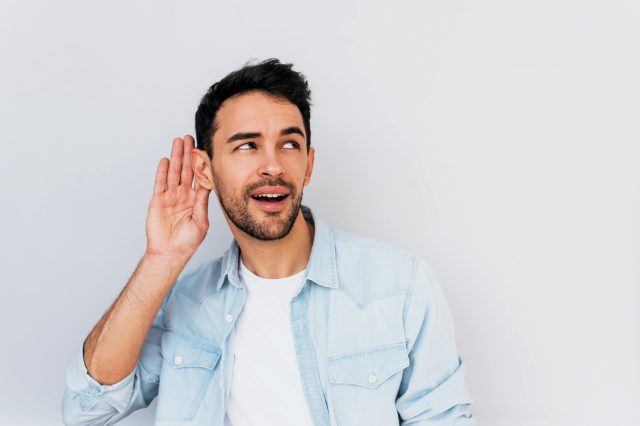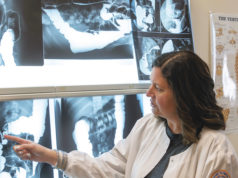Local expert discusses the importance of auditory health during National Protect Your Hearing Month.
By Cory Sekine-Pettite
October is National Protect Your Hearing Month. So, Cobb In Focus once again wanted to take this opportunity to publicize the importance of auditory health and the prevention of hearing loss. It’s a topic we’ve covered in the past and certainly an issue that deserves more attention.
As we’ve previously reported, hearing loss is the third most prevalent chronic disability in the United States. According to the National Institutes of Health (NIH), one in eight people in the United States (13 percent, or 30 million) aged 12 years or older has hearing loss in both ears, based on the standard hearing medical examination. Moreover, the NIH says about 2 percent of adults aged 45 to 54 have disabling hearing loss. The rate increases to 8.5 percent for adults aged 55-64, and nearly 25 percent of those aged 65-74 and 50 percent of those who are 75 and older have disabling hearing loss. This is not a small problem. It is, however, a fixable problem.
First, we all should be actively protecting our hearing and working to prevent hearing loss. Second, if you have experienced hearing loss, you shouldn’t ignore it. There are remedies to improve your hearing and therefore your daily life. Thus, we asked Mark Stevenson, owner of American Family Hearing Aid Center in Marietta to tell us how to take care of our hearing, and we wanted to learn about the latest technology behind modern hearing aids.
Hearing loss prevention
Exposure to loud noises is the most common cause of hearing loss. Surprisingly, many of us may not even know we are doing it to ourselves. It isn’t just a singular, loud noise (such as proximity to gunfire) that can cause permanent damage to your hearing. Consistent exposure to noises such as high-volume music, construction equipment, lawn equipment, and industrial machinery can lead to just as much damage as a single, deafening event. We all must be aware of our surroundings and work to protect our hearing. Disposable foam plugs, over the ear muffs, or custom hearing protection devices are good options. “Forty million Americans suffer from hearing loss, and about 10 million of those [cases] can be attributed to noise-induced hearing loss,” Mr. Stevenson said.
“Normal conversation, just like talking one on one, can reach about 60 decibels (dB) with that, and you’re safe,” he added. “But if you get to 70 dB for an extended period, that can actually cause some hearing damage. …If you’re exposed to that on a regular basis, that can actually damage some hearing. Now, when you hit a 120 dB, that’s going to cause immediate damage.” (See the “Noise exposure limits” sidebar for more info on how decibel levels effect your hearing.)
It also should be noted that nutrition can play a key role in auditory health. As reported by the Hearing Health Foundation, diets rich in fresh fruits and vegetables, seeds, nuts, legumes, whole grains, seafood, poultry, and low-fat dairy can decrease the likelihood of hearing loss by at least 30 percent. This was the conclusion of a lengthy study by Brigham and Women’s Hospital that monitored the hearing health of more than 70,000 women on various diets over a 22-year period. Among the key nutrients that aid in good auditory development and health are potassium (found in bananas and potatoes), zinc (found in cashews, almonds, and dark chocolate), and folic acid (found in spinach, broccoli, and asparagus).
Don’t ignore the problem
Hearing loss isn’t just a problem for the elderly. Mr. Stevenson, a Marietta native who has 22 years of experience in the hearing industry, says he has just as many patients under the age of 60 as over the age of 60. He noted that there are several types or causes for hearing loss, some of which can be corrected with hearing aids while others may require surgery or other medical interventions. But whatever the cause may be, people really shouldn’t ignore any potential problems with their auditory health. “It’s just always best if you feel like you’re having a problem to get it tested and checked. And it could be something in there that’s a medical issue that needs to be addressed sooner rather than later,” Mr. Stevenson said.
Mr. Stevenson, who opened his own practice in 2016 (145 N Marietta Pkwy NE, Suite E, Marietta), says his mission is simple: to focus on the unique needs of each patient and treat their hearing loss individually. One of the early signs to look for regarding hearing loss, he said, is a ringing in the ears (known as tinnitus). But this isn’t always the case; some people experience hearing loss without ever having tinnitus first. Additionally, he said if you constantly are asking people to repeat themselves in everyday conversations, you could have a hearing issue. The problem won’t get better on its own. Truthfully, he added, we all should consider getting our hearing checked every year as part of our routine check-ups.
If you visit the American Family Hearing Aid Center, the check-up process is simple. Mr. Stevenson said he first inspects the auditory canal and the ear drums to make sure everything’s healthy and there are no impediments such as a buildup of cerumen (ear wax). He also looks for signs of infection that could be affecting a person’s hearing. “If the ear canal is clear, then we go through other steps to try to find out what the problem is,” he said.
A big concern for Mr. Stevenson regarding people who ignore their hearing loss is the potential for cognitive decline. He pointed to several studies, including one from Johns Hopkins Medicine, that has linked hearing loss to walking problems, falls, and dementia. In its study (available at hopkinsmedicine.org), Johns Hopkins followed 639 adults for nearly 12 years, and found that mild hearing loss doubled dementia risk. “Brain scans show us that hearing loss may contribute to a faster rate of atrophy in the brain,” reported Frank Lin, M.D., Ph.D., in that study. “Hearing loss also contributes to social isolation. You may not want to be with people as much, and when you are you may not engage in conversation as much. These factors may contribute to dementia.”
 “We don’t hear with our ears. It’s a tool to get the sound to the brain, but we hear with our brain, and we process speech with our brain. And the less you use that [tool], the less you can use it,” Mr. Stevenson said.
“We don’t hear with our ears. It’s a tool to get the sound to the brain, but we hear with our brain, and we process speech with our brain. And the less you use that [tool], the less you can use it,” Mr. Stevenson said.
Hearing aid tech
Once there is damage to the nerve cells in your ear canal, it is irreversible. However, some people may be good candidates for assistance from hearing aids, which can help people hear the soft sounds of speech and the softer sounds of our environment, but nothing can reverse the physical impairment of the cochlea (the organ of hearing). “One thing hearing aids will do is slow down the auditory deprivation,” Mr. Stevenson said. “So, if the nerves are damaged from noise exposure, they become very weak and they don’t respond, which is why people don’t understand speech, because the nerves do not separate or break down those frequencies. Hearing devices stimulate the nerves and can slow down that continual loss. But there is no way to actually reverse nerve damage. …Wearing the hearing devices keeps that drop in hearing from continuing near as quickly as it would if you didn’t wear anything.”
Further, the design and technology of today’s hearing aids far exceeds anything you’ve likely seen before. Depending on your needs, there are devices that are made to fit completely inside your ear canal meaning the average person would never even know you are wearing one. There are devices that go behind the ear. There are numerous materials available. There are different battery style options (including rechargeable). And there even are hearing aids that offer activity tracking and fall detection. Mr. Stevenson said these particular high-tech devices use artificial intelligence to assure your ears are operating at full capacity. “These devices give you a ‘brain score,’ they give you a ‘health score.’ They track steps for fitness. It’s all built into the hearing device,” he said. “It tracks how much you’re picking up on speech and how much you’re using your brain to converse. And it actually gives you a score. You want to try to keep that same score so you know that your brain health is where it needs to be.” As Mr. Stevenson put it, this is super-cool stuff.
Of course, your needs may require a different device. American Family Hearing Center can help you make that determination. But you must take that first step and contact them for an appointment.
Noise exposure limits
One way that noise can permanently damage your hearing is by a single brief exposure to a high noise level, such as a firecracker going off near your ear. But hearing damage can also occur gradually at much lower levels of noise if there is enough exposure over time. To protect your hearing, you’ll want to limit your exposure to these moderately high noise levels as well, and give your ears a chance to recover after any period of noise exposure. For example:
- At 91 decibels, your ears can tolerate up to two hours of exposure.
- At 100 decibels, damage can occur with 15 minutes of exposure.
- At 112 decibels, damage can occur with only one minute of exposure.
- At 140 decibels, immediate nerve damage can occur.
Firearms, firecrackers, and jet engines taking off are all louder than 140 dB. If you find yourself near any of these without hearing protection, use your fingers and plug your ears! And at the same time, move away from the noise — even a few extra feet can reduce the loudness significantly. —Source: noisehelp.com




